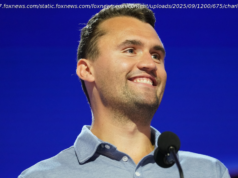Gary Oldman has arrived as the first legitimate best actor Oscar frontrunner of the year with his performance in « Darkest Hour. »
For actor Gary Oldman, an Oscar nomination was elusive for many years. An Oscar win, however, could be around the corner.
The chameleonic star had dazzled for decades in an endless string of films — “Sid and Nancy, ” “State of Grace, ” “True Romance, ” “Leon: The Professional, ” “The Contender, ” “Hannibal, ” etc. — until 2011, when his work was finally recognized by the Motion Picture Academy. It wasn’ t one of his trademark Baroque performances that got the call, but rather, his icy cool portrait of a British intelligence operative in Tomas Alfredson’s “Tinker Tailor Soldier Spy.” The man has nothing if not range, and that range now extends to Sir Winston Churchill, about as larger-than-life as it gets.
In Joe Wright’s World War II drama “ Darkest Hour, ” which unspooled at the Telluride Film Festival Friday, Oldman’s showcase might be his finest hour. He digs into the towering role with uncanny resolve, fearless under gobs of makeup, fully crafting not simply an impression of a man but the fiery soul of a character.
From ‘The Crown’ to ‘Darkest Hour,’ Wealth of Churchill Projects Signals Hunger for Leadership
The last year has been marked by a rash of Churchill projects in film and television. Brian Cox (“Churchill”) navigated Churchill’s crushing doubts later in the war. Michael Gambon (“Churchill’s Secret”) delivered him at his most vulnerable, suffering in the wake of a stroke. John Lithgow (“The Crown”) offered a latter-day portrait as well, with Churchill as counsel to an unprepared new monarch. But “Darkest Hour’s” pressure-cooked atmosphere is what allows Oldman to deliver so definitively.
The film charts the turbulent month from Churchill’s instatement as Prime Minister amid lacking confidence in his predecessor Neville Chamberlain, through the valiant Operation Dynamo (dramatized earlier this year in Christopher Nolan’s “Dunkirk”) and Churchill’s famed “we shall fight on the beaches” speech following the British Army’s skin-of-its-teeth evacuation from the shores of France. Oldman’s Churchill is a man of steel resolve throughout, but while the actor luxuriates in his subject’s grit, he also fully inhabits his nuances and grace notes. He’s totally unencumbered by the prosthetics, shining right through with as lived-in a depiction of the man as we’ ve ever seen.
The film itself is otherwise an across-the-board player. Certainly best picture and best director are on the table. Anthony McCarten’s screenplay wrangles a lot of history, and a lot of exposition, into an electric throughline. Bruno Delbonnell’s smokey photography is mouth-watering, while of course, design elements are superlative. The makeup and hairstyling Oscar could even be decided. And if there is anyone else from the cast that pops, it might be Ben Mendelsohn as King George VI, who faces his own internal struggle and serves as a calming foil along the way.
But this is Oldman’s show. He simply owns the movie.
The best actor Oscar race hasn’ t caught fire at all yet this season. (Lead actress, conversely, is set to ignite at this very festival.) So consider Oldman the unequivocal frontrunner at the moment. He’s likely to remain that way, too, what with multiple Oscar-winning contenders like Daniel Day-Lewis, Tom Hanks and Denzel Washington not exactly starving for more Academy recognition. There will be others in the mix, certainly. But none is likely to match the bravado of what’s on display here.






